人教版(2019)必修第一册Unit5 Language Around the World 语法课件 (共30张PPT)
文档属性
| 名称 | 人教版(2019)必修第一册Unit5 Language Around the World 语法课件 (共30张PPT) | 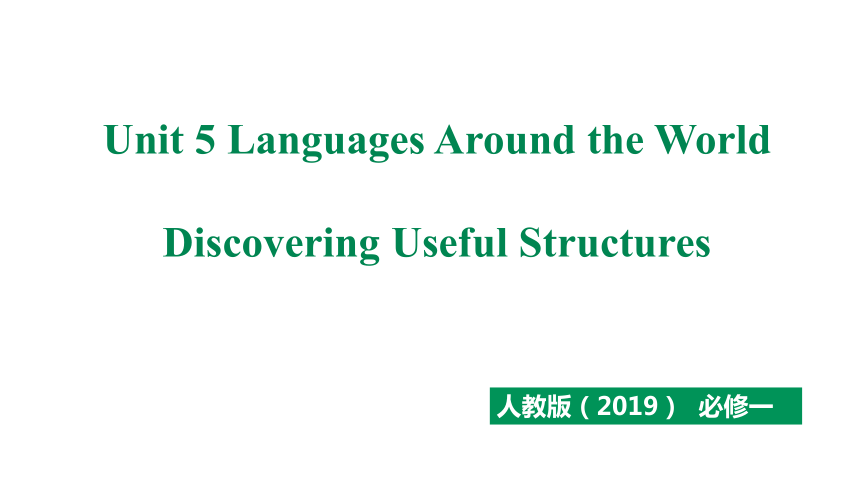 | |
| 格式 | pptx | ||
| 文件大小 | 389.4KB | ||
| 资源类型 | 教案 | ||
| 版本资源 | 人教版(2019) | ||
| 科目 | 英语 | ||
| 更新时间 | 2023-11-10 11:04:16 | ||
图片预览

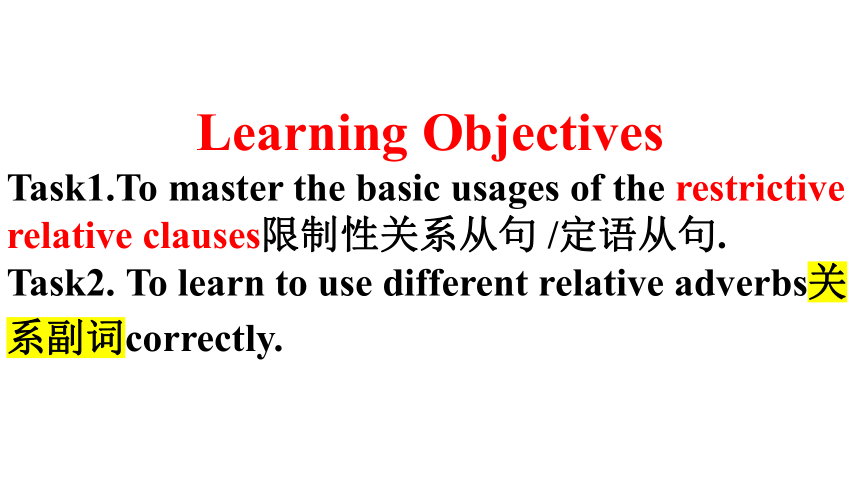
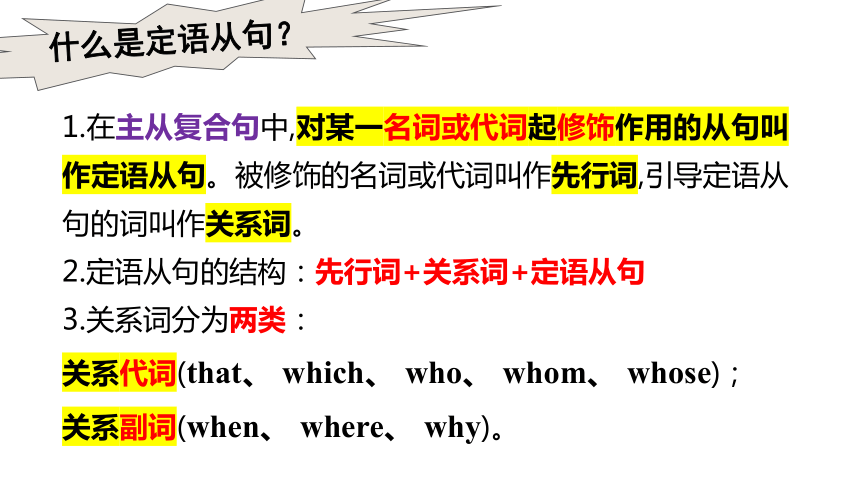
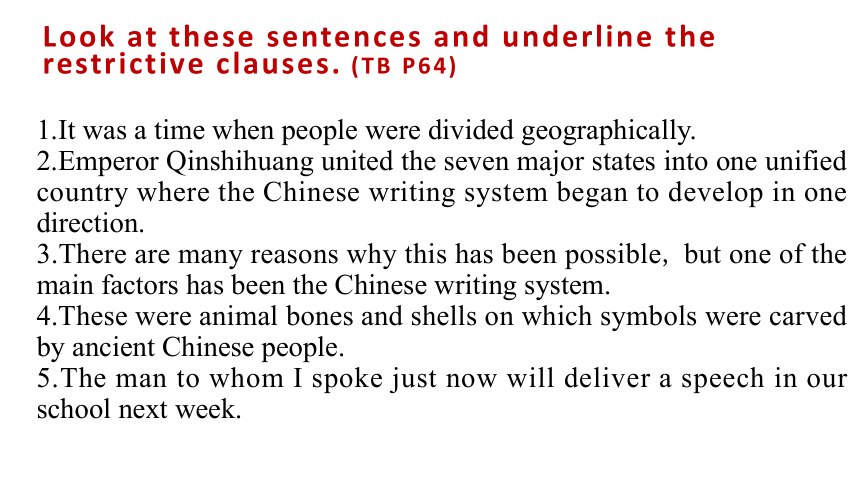
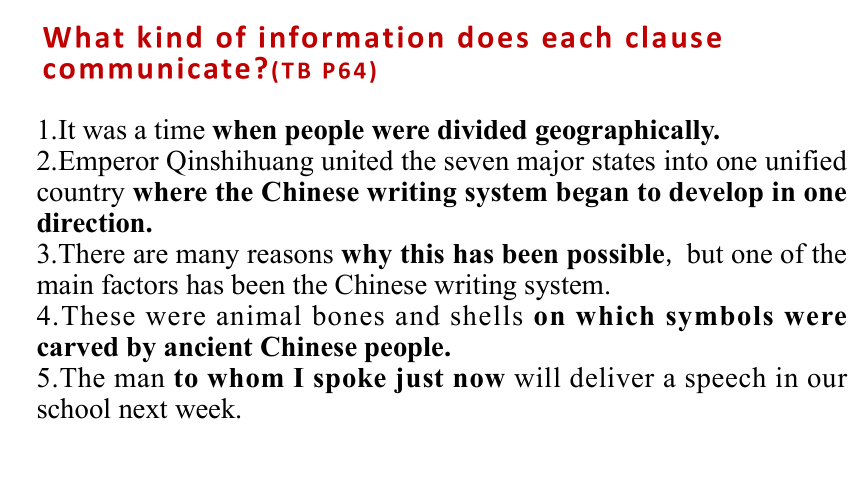
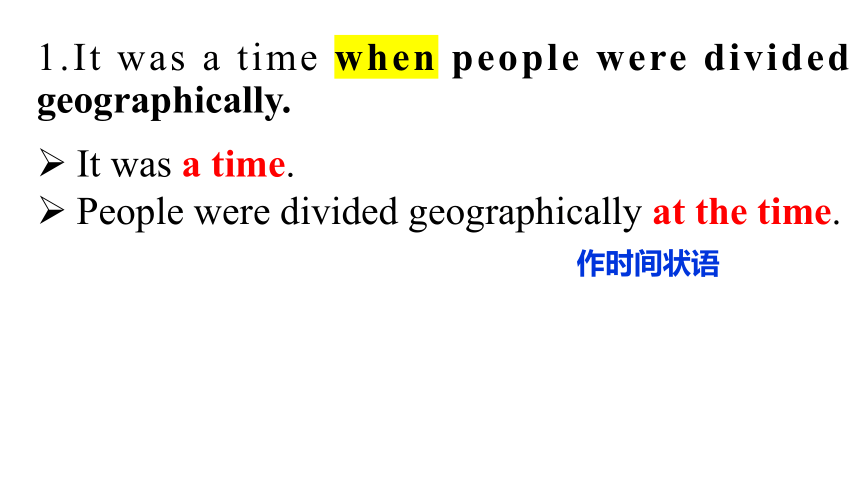
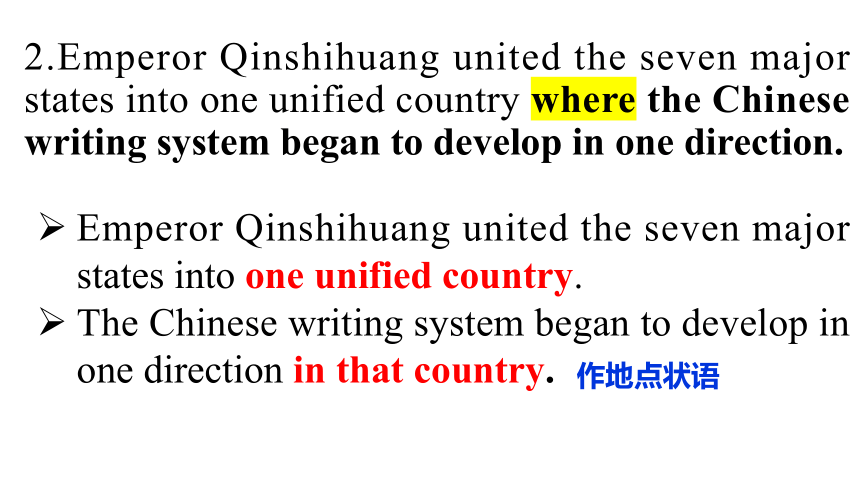
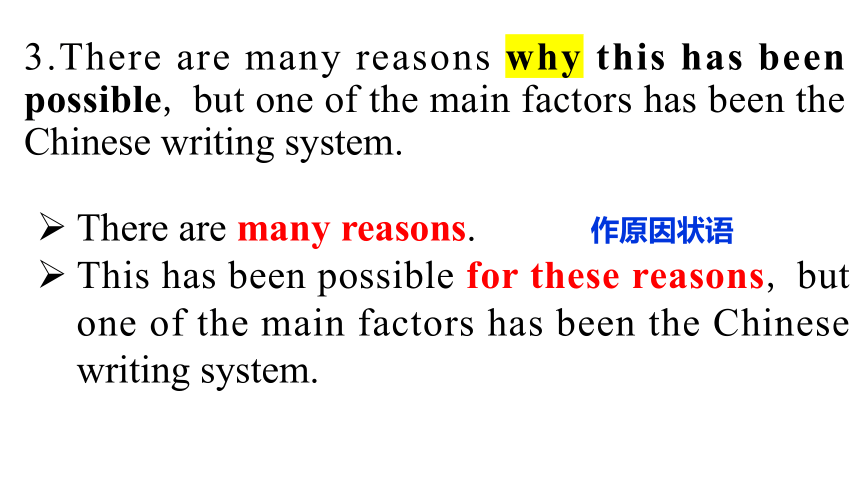
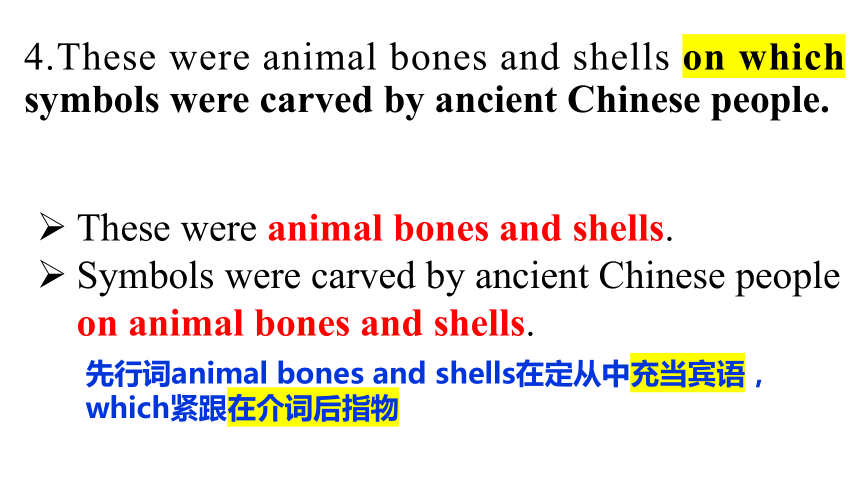
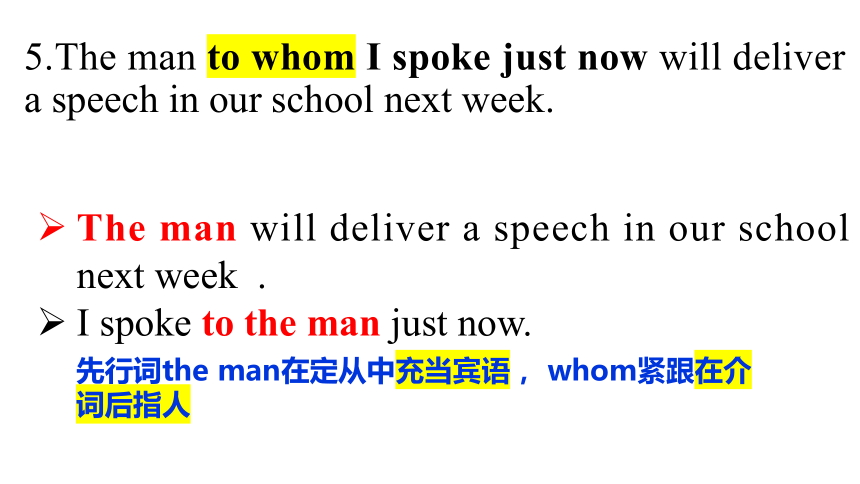
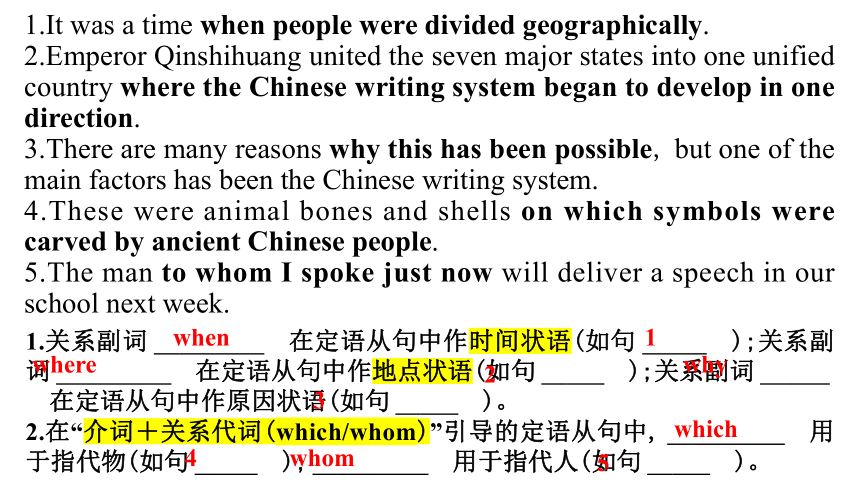
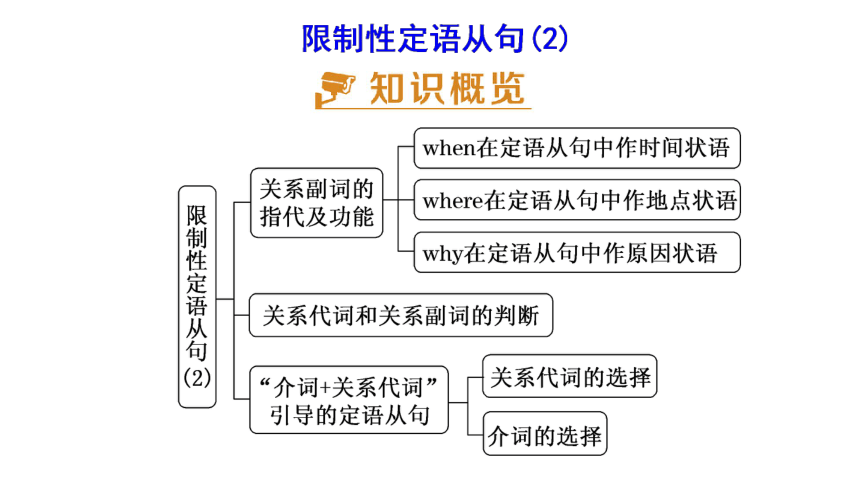
文档简介
(共30张PPT)
Unit 5 Languages Around the World
Discovering Useful Structures
人教版(2019) 必修一
Learning Objectives
Task1.To master the basic usages of the restrictive relative clauses限制性关系从句 /定语从句.
Task2. To learn to use different relative adverbs关系副词correctly.
1.在主从复合句中,对某一名词或代词起修饰作用的从句叫作定语从句。被修饰的名词或代词叫作先行词,引导定语从句的词叫作关系词。
2.定语从句的结构:先行词+关系词+定语从句
3.关系词分为两类:
关系代词(that、 which、 who、 whom、 whose);
关系副词(when、 where、 why)。
什么是定语从句?
Look at these sentences and underline the restrictive clauses. (TB P64)
1.It was a time when people were divided geographically.
2.Emperor Qinshihuang united the seven major states into one unified country where the Chinese writing system began to develop in one direction.
3.There are many reasons why this has been possible, but one of the main factors has been the Chinese writing system.
4.These were animal bones and shells on which symbols were carved by ancient Chinese people.
5.The man to whom I spoke just now will deliver a speech in our school next week.
What kind of information does each clause communicate (TB P64)
1.It was a time when people were divided geographically.
2.Emperor Qinshihuang united the seven major states into one unified country where the Chinese writing system began to develop in one direction.
3.There are many reasons why this has been possible, but one of the main factors has been the Chinese writing system.
4.These were animal bones and shells on which symbols were carved by ancient Chinese people.
5.The man to whom I spoke just now will deliver a speech in our school next week.
1.It was a time when people were divided geographically.
It was a time.
People were divided geographically at the time.
作时间状语
2.Emperor Qinshihuang united the seven major states into one unified country where the Chinese writing system began to develop in one direction.
Emperor Qinshihuang united the seven major states into one unified country.
The Chinese writing system began to develop in one direction in that country.
作地点状语
3.There are many reasons why this has been possible, but one of the main factors has been the Chinese writing system.
There are many reasons.
This has been possible for these reasons, but one of the main factors has been the Chinese writing system.
作原因状语
4.These were animal bones and shells on which symbols were carved by ancient Chinese people.
These were animal bones and shells.
Symbols were carved by ancient Chinese people on animal bones and shells.
先行词animal bones and shells在定从中充当宾语, which紧跟在介词后指物
5.The man to whom I spoke just now will deliver a speech in our school next week.
The man will deliver a speech in our school next week .
I spoke to the man just now.
先行词the man在定从中充当宾语, whom紧跟在介词后指人
1.It was a time when people were divided geographically.
2.Emperor Qinshihuang united the seven major states into one unified country where the Chinese writing system began to develop in one direction.
3.There are many reasons why this has been possible, but one of the main factors has been the Chinese writing system.
4.These were animal bones and shells on which symbols were carved by ancient Chinese people.
5.The man to whom I spoke just now will deliver a speech in our school next week.
1.关系副词 when 在定语从句中作时间状语(如句 1 );关系副词 where 在定语从句中作地点状语(如句 2 );关系副词 why 在定语从句中作原因状语(如句 3 )。
2.在“介词+关系代词(which/whom)”引导的定语从句中, which 用于指代物(如句 4 ); whom 用于指代人(如句 5 )。
when
1
where
2
why
3
which
4
whom
5
关系副词的用法
when、where、why
1.关系副词when引导的定语从句:
先行词为表示时间的名词,when在从句中作时间状语。
The Mid-Autumn Festival is a time when each family has its
members get together.
中秋节是每一个家庭团圆的时候。
I’ll never forget the day when I was trapped in a burning house.
我永远不会忘记我被困在燃烧着的房子里的那一天。
After living in Paris for fifty years, he returned to the small town where he grew up as a child.
在巴黎生活了50年后,他回到了儿时成长的那个小镇。
Beijing is the cultural center of our country, where you can visit many places of interest.
北京是我们国家的文化中心,在这里,你可以参观很多名胜古迹。
2.关系副词where引导定语从句:
先行词为表示地点的名词,where在从句中作地点状语。
I have reached a point in my life where I should make decisions of my own.
我已经到了我人生中应该自己作决定的阶段了。
where还可用在表示抽象意义的地点名词后,如situation、 stage、 point、 case、 position、 condition等。
I don’t know the reason why he didn’t turn to his good friend for help yesterday.
我不知道昨天他为什么没向他的好朋友求助。
The reasons why I am writing to apply to be a volunteer are as follows.
我写信申请成为一名志愿者的原因如下。
3.关系副词why引导定语从句时,
先行词通常是reason, why在从句中作原因状语。
用关系副词填空
①I’ll never forget the day when I received the admission
letter from Zhejiang University!
②The reason why he was late was that he got stuck in
the traffic.
③Keep the book in a place where you can find it easily.
④It was a time when I didn’t understand what death meant.
when
why
where
when
关系代词与关系副词的判断
I’ll never forget the day that/which I spent with you on the farm.
I’ll never forget the day when I worked with you on the farm.
The reason why/for which you failed was that you had not followed your mother’s advice.
The reason that/which he gave at the meeting was not so convincing.
先行词the day 在定从中,作spent的宾语; 指物用关系代词which/that
先行词the day 在定从中,作时间状语on the day,用关系副词when=on which
先行词the reason 在定从中,作原因状语for the reason,用关系副词why=for which
先行词the reason 在定从中,作gave的宾语,指物用关系代词which/that
表示时间、地点及原因的名词作先行词时,
若关系词在定语从句中作状语,应用关系副词;
若关系词在定语从句中作主语或宾语,则应用关系代词。
I’ll never forget the day that/which I spent with you on the farm.(关系代词作spent的宾语)
I’ll never forget the day when I worked with you on the farm.(关系副词作时间状语, when=on which)
The reason why/for which you failed was that you had not followed your mother’s advice.(定语从句中缺少状语,用why或for which作原因状语)
The reason that/which he gave at the meeting was not so convincing.(定语从句中缺少宾语,用that或which,不用why)
用适当的关系词填空
①It happened in November when the weather was wet
and cold.
②The reason that/which her husband explained sounded
reasonable.
③The reason why I write this letter to you is that I have
a problem in respect of the writing style.
④I’d like to live in the house where there is plenty of
sunshine.
⑤This is the house that/which was built by my grandfather
forty years ago.
when
that/which
why
where
that/which
从句缺状语
从句缺宾语
从句缺状语
从句缺状语
从句缺主语
介词+关系代词
Yesterday we visited the West Lake for which Hangzhou is famous.
This is the camera with which he often takes photos.
The boss in whose company Mr King worked heard about the accident.
Yesterday we visited the West Lake.
Hangzhou is famous for the West Lake.
This is the camera.
He often takes photos with the camera.
The boss heard about the accident.
Mr King worked in the company of the boss.
Yesterday we visited the West Lake for which Hangzhou is famous.
This is the camera with which he often takes photos.
The boss in whose company Mr King worked heard about the accident.
“介词+关系代词”,作介词的宾语时,
指“人”,用“介词+whom”;
指“物”,用“介词+which”;
关系代词有时也用whose(作定语)。
介词如何选择?
The factory in which I’m working mainly produces computers.
This is the book about which we talked yesterday.
Mr Field graduated in 2009, after which he entered a famous
IT company.
The factory mainly produces computers.
I’m working in the factory.
This is the book.
We talked about the book yesterday.
Mr Field graduated in 2009.
He entered a famous IT company after graduation.
.
介词选择的三个原则“一先、二动、三意义”。
(1)“一先”,即根据先行词的习惯搭配或意义来确定介词。
(2)“二动”,即根据定语从句中的谓语动词的习惯搭配来确定介词。
(3)“三意义”,即根据定语从句所表达的意义来确定介词。
用“介词+关系代词”填空
①The woman to whom you spoke just now is our English teacher.
②This is the farm on which my father grows fruit and vegetables.
③There is a big window through which I can see the railway
station.
④I have some American friends from whom I have learned much
about the American customs.
to whom
on which
through which
from whom
从句缺宾语:speak to sb
从句缺状语:on a farm
从句缺状语:through the window
从句缺宾语:learn from sb.
Complete the passage with the correct relative adverbs or pronouns. Add a preposition where necessary.
When I started studying German, it was a struggle. The words felt strange on my tongue, and the grammar would not stay in my head. I told my mum that I wanted to give up, and that I would never live in a country ______________ German was spoken. My mum told me that studying a language was not just for my future.
where/in which
课本P64
It was exercise for the brain; the more I learnt of a language, the more my brain would grow. And I remember that day _______________ I suddenly felt like German was no longer a foreign language. It felt like my brain had doubled in size. I had finally come to a place ______________ I could think in this foreign language, and I could see the world from a different point of view.
when/on which
where/at which
I felt as if I had reached the goal __________ I had been fighting for. I could open a book and see meanings, not just a sea of words. I finally understood the reason __________ my mum had encouraged me not to give up. Thanks, Mum!
which/that
why
Unit 5 Languages Around the World
Discovering Useful Structures
人教版(2019) 必修一
Learning Objectives
Task1.To master the basic usages of the restrictive relative clauses限制性关系从句 /定语从句.
Task2. To learn to use different relative adverbs关系副词correctly.
1.在主从复合句中,对某一名词或代词起修饰作用的从句叫作定语从句。被修饰的名词或代词叫作先行词,引导定语从句的词叫作关系词。
2.定语从句的结构:先行词+关系词+定语从句
3.关系词分为两类:
关系代词(that、 which、 who、 whom、 whose);
关系副词(when、 where、 why)。
什么是定语从句?
Look at these sentences and underline the restrictive clauses. (TB P64)
1.It was a time when people were divided geographically.
2.Emperor Qinshihuang united the seven major states into one unified country where the Chinese writing system began to develop in one direction.
3.There are many reasons why this has been possible, but one of the main factors has been the Chinese writing system.
4.These were animal bones and shells on which symbols were carved by ancient Chinese people.
5.The man to whom I spoke just now will deliver a speech in our school next week.
What kind of information does each clause communicate (TB P64)
1.It was a time when people were divided geographically.
2.Emperor Qinshihuang united the seven major states into one unified country where the Chinese writing system began to develop in one direction.
3.There are many reasons why this has been possible, but one of the main factors has been the Chinese writing system.
4.These were animal bones and shells on which symbols were carved by ancient Chinese people.
5.The man to whom I spoke just now will deliver a speech in our school next week.
1.It was a time when people were divided geographically.
It was a time.
People were divided geographically at the time.
作时间状语
2.Emperor Qinshihuang united the seven major states into one unified country where the Chinese writing system began to develop in one direction.
Emperor Qinshihuang united the seven major states into one unified country.
The Chinese writing system began to develop in one direction in that country.
作地点状语
3.There are many reasons why this has been possible, but one of the main factors has been the Chinese writing system.
There are many reasons.
This has been possible for these reasons, but one of the main factors has been the Chinese writing system.
作原因状语
4.These were animal bones and shells on which symbols were carved by ancient Chinese people.
These were animal bones and shells.
Symbols were carved by ancient Chinese people on animal bones and shells.
先行词animal bones and shells在定从中充当宾语, which紧跟在介词后指物
5.The man to whom I spoke just now will deliver a speech in our school next week.
The man will deliver a speech in our school next week .
I spoke to the man just now.
先行词the man在定从中充当宾语, whom紧跟在介词后指人
1.It was a time when people were divided geographically.
2.Emperor Qinshihuang united the seven major states into one unified country where the Chinese writing system began to develop in one direction.
3.There are many reasons why this has been possible, but one of the main factors has been the Chinese writing system.
4.These were animal bones and shells on which symbols were carved by ancient Chinese people.
5.The man to whom I spoke just now will deliver a speech in our school next week.
1.关系副词 when 在定语从句中作时间状语(如句 1 );关系副词 where 在定语从句中作地点状语(如句 2 );关系副词 why 在定语从句中作原因状语(如句 3 )。
2.在“介词+关系代词(which/whom)”引导的定语从句中, which 用于指代物(如句 4 ); whom 用于指代人(如句 5 )。
when
1
where
2
why
3
which
4
whom
5
关系副词的用法
when、where、why
1.关系副词when引导的定语从句:
先行词为表示时间的名词,when在从句中作时间状语。
The Mid-Autumn Festival is a time when each family has its
members get together.
中秋节是每一个家庭团圆的时候。
I’ll never forget the day when I was trapped in a burning house.
我永远不会忘记我被困在燃烧着的房子里的那一天。
After living in Paris for fifty years, he returned to the small town where he grew up as a child.
在巴黎生活了50年后,他回到了儿时成长的那个小镇。
Beijing is the cultural center of our country, where you can visit many places of interest.
北京是我们国家的文化中心,在这里,你可以参观很多名胜古迹。
2.关系副词where引导定语从句:
先行词为表示地点的名词,where在从句中作地点状语。
I have reached a point in my life where I should make decisions of my own.
我已经到了我人生中应该自己作决定的阶段了。
where还可用在表示抽象意义的地点名词后,如situation、 stage、 point、 case、 position、 condition等。
I don’t know the reason why he didn’t turn to his good friend for help yesterday.
我不知道昨天他为什么没向他的好朋友求助。
The reasons why I am writing to apply to be a volunteer are as follows.
我写信申请成为一名志愿者的原因如下。
3.关系副词why引导定语从句时,
先行词通常是reason, why在从句中作原因状语。
用关系副词填空
①I’ll never forget the day when I received the admission
letter from Zhejiang University!
②The reason why he was late was that he got stuck in
the traffic.
③Keep the book in a place where you can find it easily.
④It was a time when I didn’t understand what death meant.
when
why
where
when
关系代词与关系副词的判断
I’ll never forget the day that/which I spent with you on the farm.
I’ll never forget the day when I worked with you on the farm.
The reason why/for which you failed was that you had not followed your mother’s advice.
The reason that/which he gave at the meeting was not so convincing.
先行词the day 在定从中,作spent的宾语; 指物用关系代词which/that
先行词the day 在定从中,作时间状语on the day,用关系副词when=on which
先行词the reason 在定从中,作原因状语for the reason,用关系副词why=for which
先行词the reason 在定从中,作gave的宾语,指物用关系代词which/that
表示时间、地点及原因的名词作先行词时,
若关系词在定语从句中作状语,应用关系副词;
若关系词在定语从句中作主语或宾语,则应用关系代词。
I’ll never forget the day that/which I spent with you on the farm.(关系代词作spent的宾语)
I’ll never forget the day when I worked with you on the farm.(关系副词作时间状语, when=on which)
The reason why/for which you failed was that you had not followed your mother’s advice.(定语从句中缺少状语,用why或for which作原因状语)
The reason that/which he gave at the meeting was not so convincing.(定语从句中缺少宾语,用that或which,不用why)
用适当的关系词填空
①It happened in November when the weather was wet
and cold.
②The reason that/which her husband explained sounded
reasonable.
③The reason why I write this letter to you is that I have
a problem in respect of the writing style.
④I’d like to live in the house where there is plenty of
sunshine.
⑤This is the house that/which was built by my grandfather
forty years ago.
when
that/which
why
where
that/which
从句缺状语
从句缺宾语
从句缺状语
从句缺状语
从句缺主语
介词+关系代词
Yesterday we visited the West Lake for which Hangzhou is famous.
This is the camera with which he often takes photos.
The boss in whose company Mr King worked heard about the accident.
Yesterday we visited the West Lake.
Hangzhou is famous for the West Lake.
This is the camera.
He often takes photos with the camera.
The boss heard about the accident.
Mr King worked in the company of the boss.
Yesterday we visited the West Lake for which Hangzhou is famous.
This is the camera with which he often takes photos.
The boss in whose company Mr King worked heard about the accident.
“介词+关系代词”,作介词的宾语时,
指“人”,用“介词+whom”;
指“物”,用“介词+which”;
关系代词有时也用whose(作定语)。
介词如何选择?
The factory in which I’m working mainly produces computers.
This is the book about which we talked yesterday.
Mr Field graduated in 2009, after which he entered a famous
IT company.
The factory mainly produces computers.
I’m working in the factory.
This is the book.
We talked about the book yesterday.
Mr Field graduated in 2009.
He entered a famous IT company after graduation.
.
介词选择的三个原则“一先、二动、三意义”。
(1)“一先”,即根据先行词的习惯搭配或意义来确定介词。
(2)“二动”,即根据定语从句中的谓语动词的习惯搭配来确定介词。
(3)“三意义”,即根据定语从句所表达的意义来确定介词。
用“介词+关系代词”填空
①The woman to whom you spoke just now is our English teacher.
②This is the farm on which my father grows fruit and vegetables.
③There is a big window through which I can see the railway
station.
④I have some American friends from whom I have learned much
about the American customs.
to whom
on which
through which
from whom
从句缺宾语:speak to sb
从句缺状语:on a farm
从句缺状语:through the window
从句缺宾语:learn from sb.
Complete the passage with the correct relative adverbs or pronouns. Add a preposition where necessary.
When I started studying German, it was a struggle. The words felt strange on my tongue, and the grammar would not stay in my head. I told my mum that I wanted to give up, and that I would never live in a country ______________ German was spoken. My mum told me that studying a language was not just for my future.
where/in which
课本P64
It was exercise for the brain; the more I learnt of a language, the more my brain would grow. And I remember that day _______________ I suddenly felt like German was no longer a foreign language. It felt like my brain had doubled in size. I had finally come to a place ______________ I could think in this foreign language, and I could see the world from a different point of view.
when/on which
where/at which
I felt as if I had reached the goal __________ I had been fighting for. I could open a book and see meanings, not just a sea of words. I finally understood the reason __________ my mum had encouraged me not to give up. Thanks, Mum!
which/that
why
